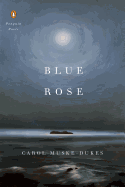
The title of American poet Carol Muske-Dukes's collection refers to a science project her daughter did when she was a child. Taking the petal of a white rose, the girl dyed it blue and stuck it under a microscope. Muske-Dukes returns to that image throughout Blue Rose, using it as a path into science, motherhood and death.
Long established in her career and admittedly "near the end of (her) life," Muske-Dukes uses many of the poems here to slink into the background, turning herself into a passive observer of the plight of others. "Workshop" examines the lives of women in detention centers whom the poet worked with in the '70s, never mentioning how or if Muske-Dukes's time with them helped at all. "No Hands" places her at the top of a hill, nervously watching her husband and daughter speed down it on a bike.
There's also a feeling of helplessness throughout Blue Rose. Muske-Dukes fears the loss of knowledge and reason in "The Link." The elegy for poet Adrienne Rich, "Adrienne," shows how the diminishments of age lay us all low, with Rich forcing herself to take "Step after step, forward & up: each great act of will making possible the next." Blue Rose's poems regard how humans change their surroundings and themselves, yet we're rarely sure if the right choice has been made. Ultimately, Muske-Dukes's worries and hopes seem all bound up in that image of the blue rose: something natural turned magical--a perversion of life, but beautiful. --Noah Cruickshank, adult engagement manager, the Field Museum, Chicago, Ill.

